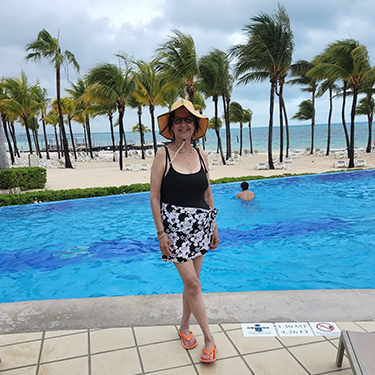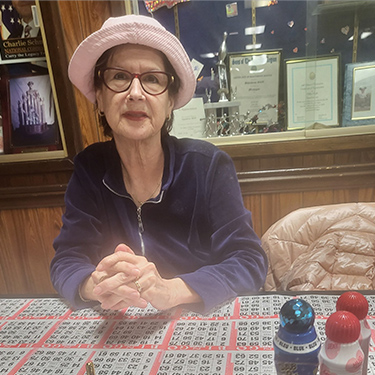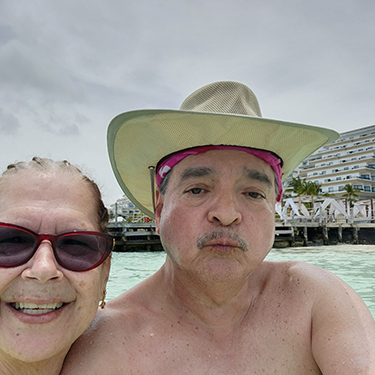One Team. All For You.
Our team of pancreatic cancer experts work together to ensure you receive an accurate diagnosis and treatment plan based on your unique needs.
 Co-workers on her maintenance team used to call Ondina Garcia “OT“ – short for “over time”. Whenever she had an opportunity to work extra hours, she did. But the many hours she spent trying to obtain an accurate diagnosis and treatment for her stomach problem almost didn’t pay off. Finally, she was referred to Henry Ford where persistent physicians found and treated pancreatic cancer. Seven years later, she has defied survival expectations and now she’s spending her OT enjoying life.
Co-workers on her maintenance team used to call Ondina Garcia “OT“ – short for “over time”. Whenever she had an opportunity to work extra hours, she did. But the many hours she spent trying to obtain an accurate diagnosis and treatment for her stomach problem almost didn’t pay off. Finally, she was referred to Henry Ford where persistent physicians found and treated pancreatic cancer. Seven years later, she has defied survival expectations and now she’s spending her OT enjoying life.
For more than a decade, Ondina cleaned floors at night in the Detroit Institute of Arts while appreciating the paintings and history. Ondina was careful to eat healthy meals – never fatty ones – yet her cholesterol was high, and her stomach often burned.
When she retired, a friend noticed her skin and eyes were slightly yellow. Ondina saw a physician not affiliated with Henry Ford, but the problem continued. After several months of unsuccessful treatment, the frustrated physician referred Ondina to Henry Ford in downtown Detroit for a second opinion.
When the couple met gastroenterologist Robert Pompa, M.D., they knew they were in good hands. “He was determined. You could see it in his face,” says Enrique, Ondina’s husband who often translates for her, being that her main language is Spanish.
 “They welcomed us. They never looked at us funny. They made us feel safe,” recalls Enrique. Still, Ondina warned the medical staff that she had a fear of doctors that caused her blood pressure to rise.
“They welcomed us. They never looked at us funny. They made us feel safe,” recalls Enrique. Still, Ondina warned the medical staff that she had a fear of doctors that caused her blood pressure to rise.
Dr. Pompa performed a biopsy of her pancreas, but nothing was found. Still, he was convinced something was wrong and wanted to do another biopsy lower in the pancreas.
Enrique refused, “I wasn’t going to put my wife through that.”
Yet Dr. Pompa persisted. Finally, Ondina and Enrique agreed. Another biopsy was done and grade 2B pancreatic cancer was found.
“I didn’t cry. I didn’t ask why it was happening to me,” says Ondina whose grandfather died of pancreatic cancer. “I just wanted that cancer monster out of me.”
“Dr. Pompa told us that we were going to need a lot of support,” says Enrique. “But I told him we could do it alone. We’re strong.”
Again, Dr. Pompa persisted and convinced the couple to contact a national support group for pancreatic cancer patients. “Finally, we took all his advice and ran with it,” says Enrique.
To discuss a treatment plan, the couple met with the entire multidisciplinary cancer team including a nurse navigator who would literally navigate them through all aspects of the treatment – even scheduling and following up on appointments with various cancer specialists.
“Our method of evaluating patients does not discriminate. It doesn’t matter if you’re wealthy or if you have zero money in the bank," says David Kwon, M.D., clinical director of the Pancreatic Cancer Center. “Everyone receives a wholistic evaluation, regardless of race, finances or any other factors.”
All the treatment options were discussed at tumor board, and Ondina was given the choice of surgery or chemotherapy and radiation therapy. She chose surgery, concerned that chemotherapy would be too taxing on her body.
Dr. Kwon performed a Whipple procedure to remove the tumor, bile duct, and part of the stomach and small intestine.
“For Ondina’s type of cancer, this surgery is the standard of care, but it has up to a 40 percent complication rate,” says Dr. Kwon. “So, patients need specialists who routinely do this surgery.”
In the recovery room, Ondina saw Dr. Pompa and kissed him. “I was so happy he found the cancer,” says Ondina. She spent eight days in the hospital and for the next three months she was fed through a tube.
“Everything was fine,” says Ondina.

Our team of pancreatic cancer experts work together to ensure you receive an accurate diagnosis and treatment plan based on your unique needs.
“She recovered better than she could have imagined, and she thought she could tolerate chemotherapy with the help of her super supportive husband,” says Dr. Kwon.
“I would buy Ondina three different soups from three different restaurants,” laughs Enrique, recalling his attempts to get her to eat. Ondina eventually lost 50 pounds and slept off the extreme fatigue.
 “My husband is like a second doctor. He’s a good babysitter for me,” jokes Ondina.
“My husband is like a second doctor. He’s a good babysitter for me,” jokes Ondina.
Following chemotherapy and a brief break, Ondina received radiation therapy twice a week for two months.
To help her get through cancer treatment, Ondina tried faith. I didn’t feel God’s love before. But now I feel it every day. God shined a light on me and made me stronger. I don’t take the days for granted, says Ondina.
“She’s a really tough and determined lady,” says Dr. Kwon. “Although she had anxiety, she was able to get through surgery, chemotherapy and radiation therapy, and I greatly admire her for that. Now she’s living a pretty amazing life.”
“I’m normal. I eat everything,” says Ondina. But instead of eating the prescribed seven small meals a day, she eats five big ones and laughs about the inevitable gas. For fun, she plays bingo on the weekends. For love, she watches her grandson three times a week, and she visits her other grandchildren and two sons. For a different kind of enjoyment, she cleans – everything.
“If the floor is clean, she’ll clean it again,” laughs Enrique. The couple recently moved from Corktown to a condo in Wayne where deer visit their yard.
Looking back, 64-year-old Ondina says, I used to be afraid of doctors, now I’m very relaxed and accepting. Dr. Kwon is excellent. He’s an outstanding doctor with a beautiful personality. Dr. Pompa is exceptional, a gifted and friendly doctor.
“They took their time and made sure we knew everything that was going to happen. We were amazed at the service we were given by high class doctors,” says Enrique. “There are good doctors at other hospitals, but Henry Ford saved my wife’s life. The doctors there know what they’re talking about. They have a no-nonsense, straight-to-the-point approach. They tell you what to do to get better. We couldn’t give Henry Ford enough thanks, no matter how hard we try.”
For someone who had a 20-30 percent chance of survival after five years, she has defied the odds, says Dr. Kwon. “Stories like this are the reason we continue to work hard and fight to give our patients opportunities to have more fulfillment and happiness in their lives.”
Don’t give up hope. Relax or pray and ask God to go with you. Stay strong and don’t weaken yourself by getting mad. Instead, accept the diagnosis, says Ondina. Do your homework and find a way to feel strong. You have to believe and don’t let the cancer get you down. I know it’s easy to say, but it’s hard to do.
It’s been seven years since her cancer diagnosis. Now, Ondina looks forward to more time with her grandsons and summertime barbeques. She and Enrique will make some home improvements, and maybe vacation in Cancun – but every day, they’ll celebrate their extended life together.
Our pancreatic cancer center combines internationally renowned expertise with leading therapies. We deliver personalized care that helps more patients achieve a renewed sense of wellbeing.

We use cookies to improve your website experience. By using this site, you agree to our Terms of Use. Read our Internet Privacy Statement to learn what information we collect and how we use it.